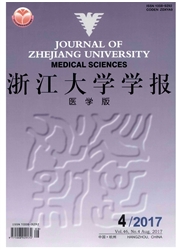

 中文摘要:
中文摘要:
目的:研究迟缓抗原-4(very late antigen-4,VLA-4)拮抗剂BIO-1211对大鼠支气管收缩和白细胞黏附反应的影响。方法:卵白蛋白致敏大鼠,抗原攻击诱发大鼠支气管收缩反应,采用整体肺功能测定法测定肺阻力(Rt,)和动态肺顺应性(Cdyn)。分离大鼠中性粒细胞,用纤维黏连蛋白(Fn)或血清诱导中性粒细胞产生黏附反应。用组胺和乙酰胆碱诱导豚鼠哮喘反应。结果:给大鼠气雾吸入BIO-1211(1、3、10mg/ml)呈剂量依赖抑制致敏大鼠抗原攻击引起RL的升高和Cdyn降低;BIO-1211(25、50、100、200μg/ml)明显抑制纤维黏连蛋白(Fn)和血清诱导的中性粒细胞黏附反应,其抑制率分别为23.5%、24.6%、61.4%、58.1%和29.99/6、35.9%、35.3%、15.49/6;但BIO-1211(10mg/ml)给豚鼠气雾吸入不能抑制乙酰胆碱和组胺诱导的药物性哮喘。结论:BIO-1211预防致敏大鼠抗原攻击引起的支气管收缩反应,可能与其抑制炎症细胞进入肺组织有关,而对炎症介质无拮抗作用。
 英文摘要:
英文摘要:
Objective: To determine the inhibitory effects of BIO-1211, a very late antigen-4 (vla-4) antagonist, on bronchoconstriction and neutrophil adhesion in rats. Methods: For evaluating ovalbumin-induced bronchoconstriction in the sensitized rats, the changes in lung resistance (RE) and lung dynamic compliance (Cdyn) were determined after antigen challenge. Neutrophils from the rats were used to determine fibronectin and serum-induced cell adhesion. The effect of BIO-1211 on wheezing was determined after inhalation of histamine and acetylcholine in guinea pigs. Results: BIO-1211 aerosol at 1, 3 and 10 mg/ml significantly inhibited the changes in lung resistance and lung dynamic compliance after antigen challenge in the sensitized rats in a dose-dependent manner. BIO-1211 at 25, 50, 100 and 200μg/ml inhibited the fibronectin-induced neutrophil adhesion by 23. 5%, 24. 6%, 61. 4% and 58. 1%, respectively, and serum-induced adhesion by 29.9%, 35.9%, 35.3% and 15.4%, respectively. Inhalation of 10 mg/ml BIO-1211 did not show any protection against histamine and acetylcholine-induced bronchoconstriction. Conclusion: BIO-1211 inhibits bronchoconstriction and neutrophil adhesion, which may be associated with its effect against bronchoconstriction in rats.
 同期刊论文项目
同期刊论文项目
 同项目期刊论文
同项目期刊论文
 Activation of PKA and phosphorylation of sodium-dependent vitamin C transporter 2 by prostaglandin E
Activation of PKA and phosphorylation of sodium-dependent vitamin C transporter 2 by prostaglandin E Leukotriene B4 via intracerebroventricular injection attenuates the antigen-induced asthmatic respon
Leukotriene B4 via intracerebroventricular injection attenuates the antigen-induced asthmatic respon Inhibition of phosphod-testerase activity, airway inflammation and hyperresponsiveness by PDE4 inhib
Inhibition of phosphod-testerase activity, airway inflammation and hyperresponsiveness by PDE4 inhib Leukotriene B4 by i.c.v attenuates the antigen-induced asthmatic response via BLT1 receptor stimulat
Leukotriene B4 by i.c.v attenuates the antigen-induced asthmatic response via BLT1 receptor stimulat 期刊信息
期刊信息
